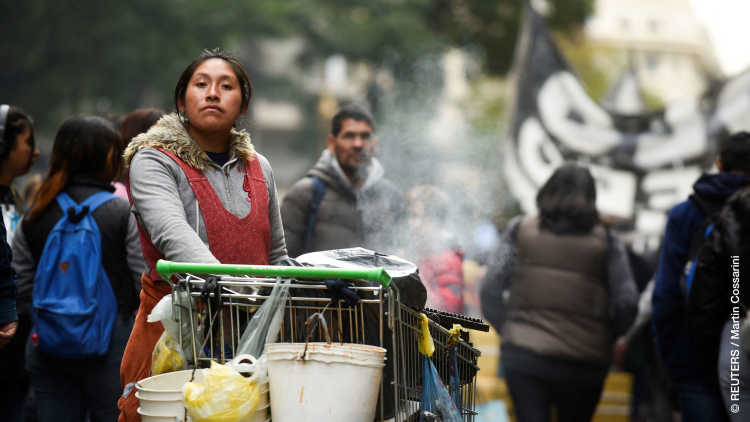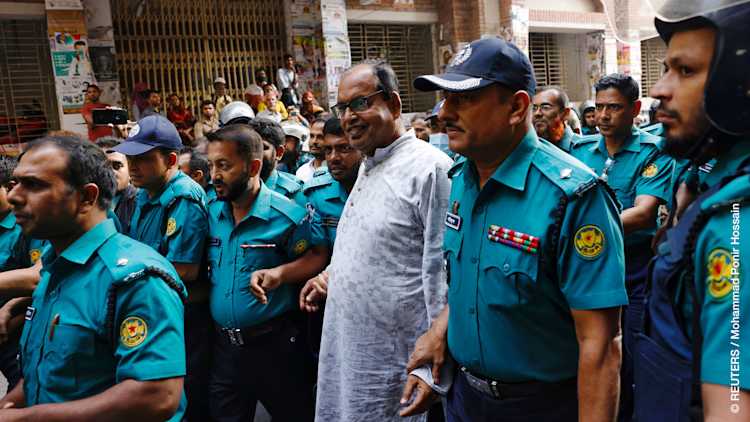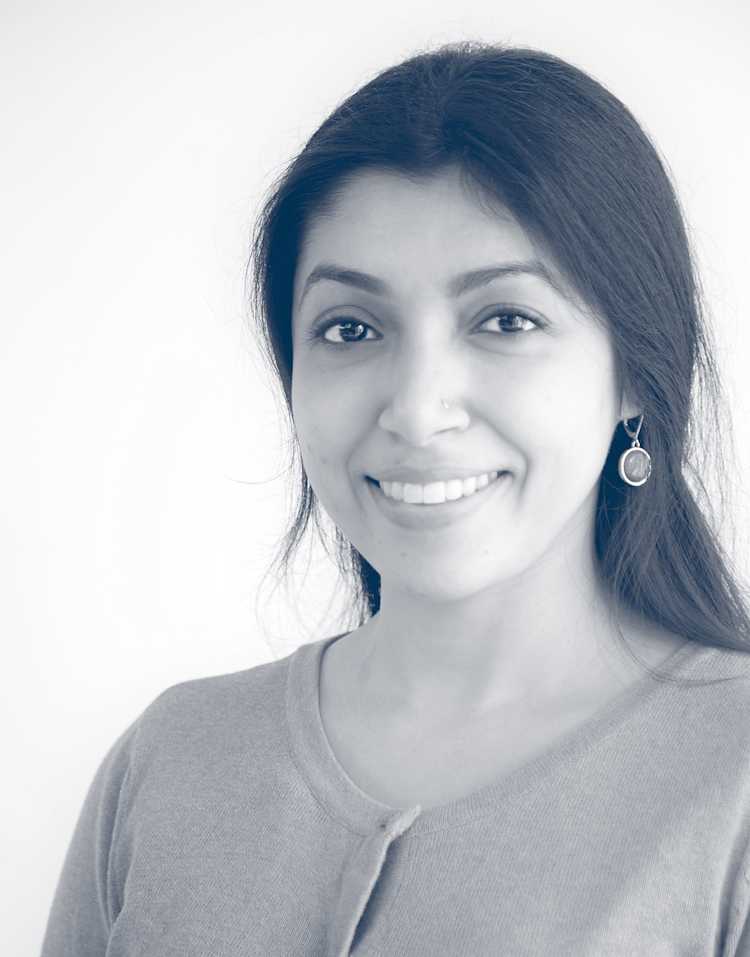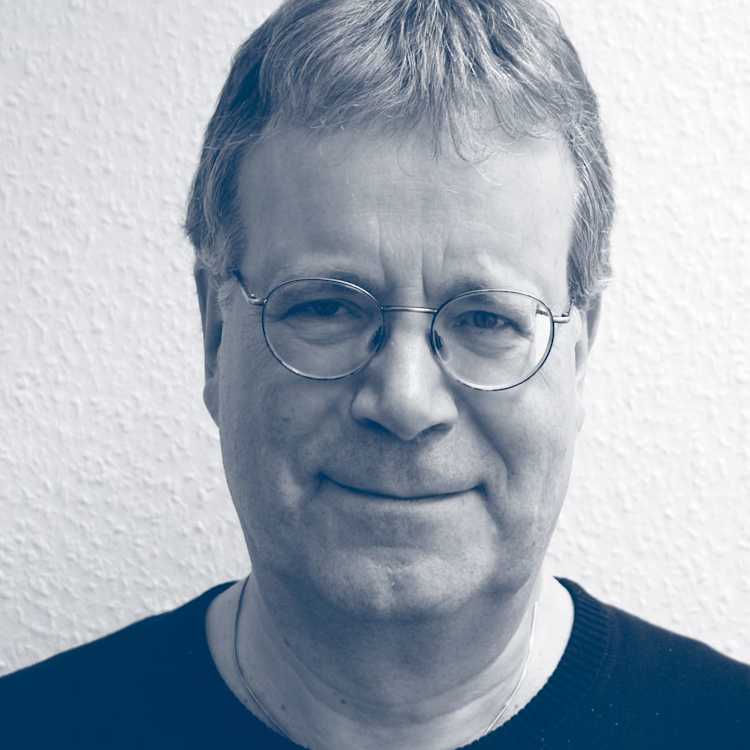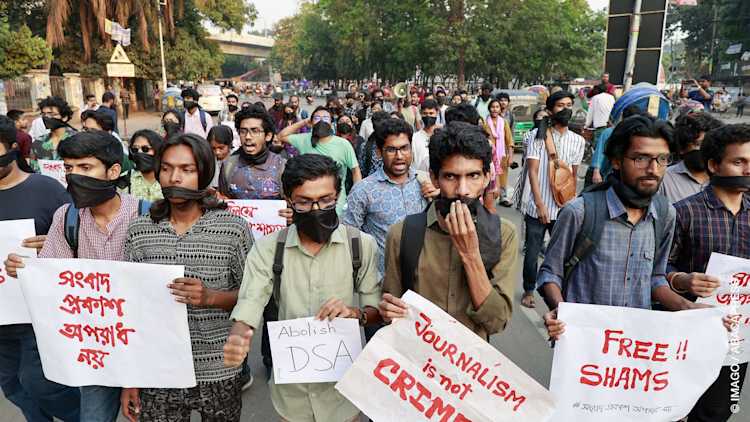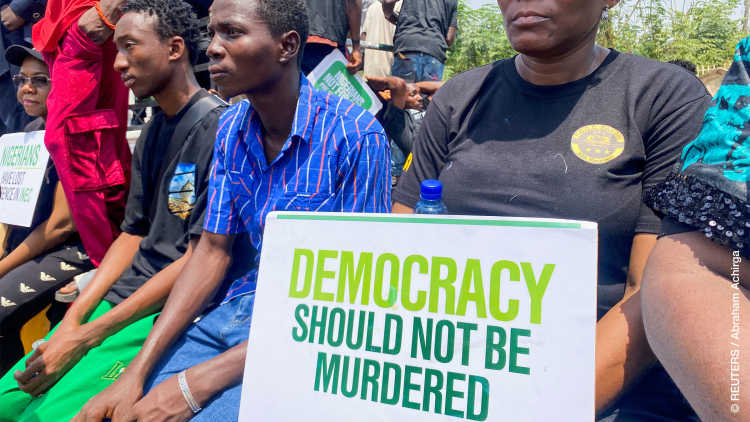- Startseite
- Publikationen
- GIGA Focus
- The Rise of Digital Repression in Indonesia under Joko Widodo
GIGA Focus Asien
The Rise of Digital Repression in Indonesia under Joko Widodo
Nummer 1 | 2024 | ISSN: 1862-359X
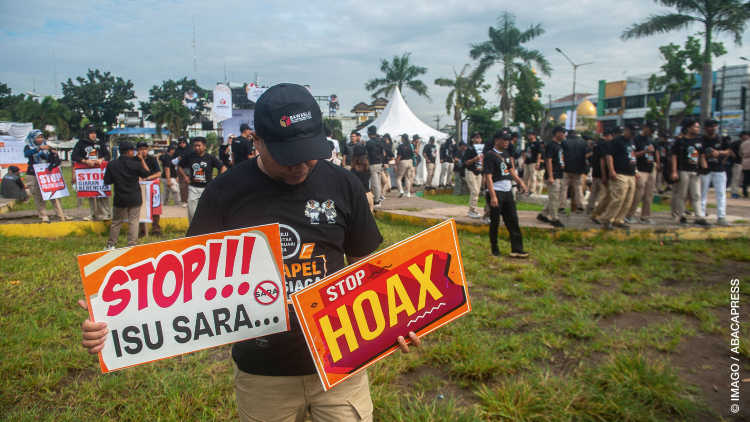
Indonesia is in a process of democratic regression. The government increasingly strives to confine civic spaces by using different instruments of digital repression such as surveillance, Internet shutdowns, lawfare, and online manipulation with the help of so-called buzzers. This is particularly alarming ahead of the concurrent parliamentary and presidential elections scheduled for February 2024.
The upcoming elections are crucial for the development of Indonesia’s electoral democracy. Right-wing populist Prabowo Subianto, who is supported by President Joko Widodo (Jokowi) and leading in most surveys, could win the presidency in 2024 and then accelerate a slow process of democratic backsliding ongoing since the early 2010s.
Social media contributes to the political discourse’s manipulation, to society’s polarisation, as well as to civil society’s fragmentation. Its platforms are a threat to the government, but political elites have reacted by misusing them to their advantage.
Jokowi, who is not allowed to run again because of a term limit, uses particularly lawfare to keep critics in check. Laws and regulations, originally designed to curb defamation and the spread of fake news, are systematically employed to intimidate and prosecute journalists, civil society activists, and academics and to instil fear among the broader public.
Government actors as well as certain political, administrative, judicial, and business elites employ buzzers to delegitimate critics and to spread disinformation, for example by manufacturing certain narratives about politicians and policies.
Policy Implications
EU policymakers, foreign governments, and donor organisations can help harmonise and define legal provisions on defamation and false information via regulation, documentation initiatives, fact-checking, and enhanced self-regulation. Also, by offering support for national and transnational networks in strategising against the spread of disinformation and undermining of the freedom of expression.
Democratic Backsliding and the 2024 Elections
In the early years after the breakdown of the New Order (1965–1998) under President Suharto, Indonesia made significant progress from a closed authoritarian military regime towards an electoral democracy with sufficiently free and fair elections. Achievements were made in fighting corruption, restraining Islamist attempts at introducing sharia criminal law at the national level, and giving space to civil society. But starting a few years ago, scholars begun to notice a democratic backsliding or illiberal turn in Indonesian politics. With respect to the “Freedom in the World” categorisation (Freedom House 2023), Indonesia was “free” from 2005 until 2013, but afterwards “partly free” with a decreasing score (2014: 64/100; 2023: 59/100). The downgrading from “free” to “partly free” in 2014 had been due to a new, restrictive law on mass organisations.
Civil society activists consistently report that their room for manoeuvre has continued to narrow down since the early 2010s.A national oligarchy consisting of businesspeople, politicians, civil servants, police, and military leaders has a common interest in further emaciating civil society (Amnesty International 2022; Freedom House 2023). Rich businesspeople and media moguls have been able to build their own political parties or take over leading positions in older ones. Today, Indonesian parties are usually programmatically weak, centralised, and personalised. Most of them forge large coalitions after elections, which observers also refer to as “cartels.” These cartels divide up the patronage goods associated with political office among themselves. Real opposition tends to be the exception in parliament, and even President Joko Widodo (Jokowi), who had declared before the 2014 elections that he wanted to end the practice of “horse-trading,” has in fact continued the tradition of “rainbow coalitions” consisting of almost all parties that have seats in parliament.
Besides, the political discourse and the way election campaigns are conducted have changed significantly over the past few years. One of the main factors behind this change is the rise in importance of social media. Although communication via the Internet was already helpful in coordinating the opposition in the fight against Suharto in the late 1990s, and despite social media having already played an important role in the country’s first free and fair elections of 1999, it is only since the 2010s that electoral campaigning has mostly come to be shaped by and dependent on the logic of social media. In the latest election campaign now underway, thousands of so-called buzzers – that is, usually paid online propagandists – as well as representatives of political parties or supporters of candidates use Facebook, Instagram, TikTok, WhatsApp, YouTube, and similar to exert influence. These buzzers push certain trends or topics and determine the major campaign narratives (Rakhmani and Sri Saraswati 2021; Sastramidjaja and Wijayanto 2022).
All these developments are alarming, all the more so because the next Indonesian president, to be elected in February 2024 (and in June if a second round is necessary), could be Prabowo Subianto. He is feared by those wishing to see a deepening of democracy in Indonesia. Recent surveys see Prabowo being ahead in the polls of his competitors Ganjar Pranowo and Anies Baswedan.
On 22 October 2023, a few days after a controversial last-minute decision by the Constitutional Court to lower the age limit for candidates, Jokowi’s son Gibran was nominated as the vice-presidential candidate and running mate of Prabowo. The Chief Justice of the Constitutional Court was Anwar Usman, brother-in-law of Jokowi. Anwar Usman was afterwards found guilty of a violation of the Constitutional Court’s code of conduct by its Ethics Council and removed from his position, but Gibran’s candidacy remains valid. Apparently, Prabowo’s unpredictable penchant for authoritarian solutions somehow parallels the technocratic pragmatism of Jokowi – who wants to see somebody in office willing to pursue his major infrastructure projects, such as the new capital Nusantara on the island of Borneo.
The Jokowi government is using legal provisions as an instrument to restrict civic space and to avoid the inclusion of a wide variety of social groups in policy- and lawmaking. In the last few years, examples hereof have been the Corruption Eradication Law, the Mining Law, the Omnibus Law on Job Creation, and the Law on the New Capital City. They have been pushed through without much consultation or deliberation. Parliament, dominated by a very broad coalition under Jokowi, hardly debated these controversial bills. Against this background of democratic backsliding and considering the upcoming elections, the key concerns here are shrinking civic space and a government often aggressively misusing new technologies as well as a range of specifically designed laws and regulations to criminalise critics.
Restricting Civic Space by Digital Repression
Indonesian civil society played a significant role in the transition from authoritarianism to electoral democracy in the early years of the new millennium. Civil society organisations (CSOs) are still often crucial in policymaking and implementation in the country, but their clout is nowadays more circumscribed. New social media platforms have strengthened civil society groups, promoted journalism “from below,” and created opportunities to influence the political discourse in helping bypass powerful political parties and the vast media apparatus. In early 2023, there were 353.8 million mobile-phone connections and 212.9 million Internet users in Indonesia (the total population is 277 million). Internet penetration stood at 77 per cent. Some 167 million Indonesians were active on social media: Instagram had 89.15 million and X (formerly Twitter) had 24 million users; meanwhile, 9.9 million Indonesians aged 18 and above had a TikTok account (Datareportal 2023).
However, this enormous online presence has also brought many anti-democratic forces onto the scene, who are often particularly adept at spreading propaganda, disinformation, and hate speech. To Indonesian elites, the Internet is a threat – but at the same time, they have learned that it also offers a range of opportunities to manipulate public opinion and to suppress opposition. In this vein, Feldstein defines digital repression as
the use of information and communications technology to surveil, coerce, or manipulate individuals or groups in order to deter specific activities or beliefs that challenge the state. (Feldstein 2021: 25)
He divides digital repression into surveillance, censorship, social manipulation and disinformation, Internet shutdowns, and targeted persecution of online users. The Indonesian government uses a mix of these tools.
Surveillance, Shutdowns, and Digital Attacks
Repression is nowadays more fine-grained and sophisticated than under Suharto and his New Order regime. Physical attacks still play a prominent role, but with reference to most CSOs creating an atmosphere of fear and intimidation that promotes self-censorship seems to be the dominant approach. According to the latest “Freedom on the Internet” report (2023), Indonesia was classified as “partly free” and scored 47 out of 100 points. This number has been decreasing since 2016 (56/100). In recent years, the government has intensified its surveillance capabilities. In 2021, the national police formed a “Cyber Unit” and thereby extended its abilities to surveil social media with the help of spyware such as Pegasus. The Ministerial Regulation 5/2020 forced private digital services and platforms to register with the Ministry of Communication and Information Technology – some 48 applications and platforms were then blocked because they missed the August 2022 deadline for registration –and to provide private-user data to government agencies. These devices can thus be used to surveil civil society activists and journalists.
At times, the government employs instruments such as Internet shutdowns or throttled bandwidth. In May 2019, for example, it blocked access to social media for almost a week after riots broke out in the wake of Jokowi’s election. In Papua, one of the many such shutdowns occurred between August and September 2019 following mass demonstrations. In Wadas, a village in Central Java, the Internet was cut off after protests against a proposed andesite mine in February 2022.
According to the Southeast Asia Freedom of Expression Network (2023), digital attacks such as the hacking of social media accounts and data theft went from 147 recorded cases in 2020, to 193 in 2021, to 302 cases in 2022. Almost half of the victims were civil society activists and journalists. From January 2019 until May 2022, Amnesty International (2022) recorded 834 victims of 328 physical and/or digital attacks and acts of intimidation directed against civil society. Civil society activists speak of a chilling effect (Carson and Gibbons 2023) because everybody always has to be aware of surveillance and potential legal prosecution (from a global perspective: Lim and Bradshaw 2023). A report by theSurvey Institute of Indonesia (Lembaga Survei Indonesia 2019) shows that 43 per cent of respondents (compared to 17 per cent five years earlier) were reluctant to express dissenting opinions on political matters. Likewise, a survey by Indikator Politik (Alfarizi 2022) found that almost 63 per cent of Indonesians are afraid of expressing their opinion. This is also due to a growing, quite obvious instrumentalisation of the country’s laws and courts.
Lawfare
In 2008, the Indonesian parliament passed the Electronic Information and Transactions Law (UU ITE 1/2008), which was widely criticised because it defined criminal offences very vaguely. Thereby, the police and judiciary were now free to behave in an arbitrary manner. It was amended in 2016 and facilitated the blocking of content and widened the notion of “defamation” by henceforth including content published unintentionally or by third parties.
UU ITE’s Article 27 Clause 3 on defamation (“Any Person who intentionally and without the right to distribute, transmit, or make accessible electronic information or documents that contain denigrating or defamatory material,”) and Article 28 Clause 2 on hate speech (“Any Person who knowingly and without authority disseminates information aimed at inflicting hatred or dissension on individuals and/or certain groups of community”) are the law’s two most commonly used provisions in this context. They are often combined with Article 310 of the old Criminal Code (defamation); Articles 156 and 156a of the same legislation (blasphemy); as well as Articles 14 and 15 of Law no. 1 of 1946 (false information, or “fake news”). Electronic information includes everything disseminated via social media. This can be an interview in a daily newspaper or a statement posted on Facebook, Instagram, X, YouTube or similar, but also a message within a WhatsApp group.
The increased use of UU ITE and other laws is not necessarily an indicator of a greater restriction of civil society, but the number of prosecutions that are obviously politically motivated has soared in recent years. Any form of investigative journalism or criticism of government officials is extremely dangerous. Amnesty International Indonesia (2022) reports that 332 people were charged on related matters between January 2019 and May 2022. Students, journalists, civil society activists, academics, and in many cases people who simply express their opinions via social media are targeted. The high costs of litigation for the victims of prosecution and often biased law-enforcement agencies make it easier for powerful people to sue their critics. Often, numerous alleged violations of different laws are initially reported, which are then specified in the course of the investigation (Center for Digital Society 2022). In many cases the victims have to endure prosecution taking years, and the authorities seem to willingly force them to expend significant time and resources on legal defence.
Because of all these obvious problems with UU ITE, a revision to its terms has been planned since 2021. But negotiations took place mostly behind closed doors, and in parliament there seemed to be hardly any opposition against the vague wording of the law and the unusually harsh prison sentences accompanying violations of it. Eventually, the revision was announced in December 2023, and it turned out that the changes were insignificant.
Besides, in December 2022 parliament passed a draft of the new Criminal Code, which had been withdrawn in 2019 due to vehement protest. The slightly modified version (Law 1/2023) will not be valid until 2026, when it will replace numerous other laws. Until then, individual articles will be supplemented or clarified by ordinances. The Criminal Code has been widely criticised among civil society activists (Human Rights Watch 2022). It contains bans on insulting the president, the vice president, state institutions, and the state ideology “Pancasila” – namely, the broadly worded five principles honouring the commitment to uphold democracy and to tolerate some monotheistic religions.Articles 263 and 264 criminalise those who disseminate fake news resulting in riots, with a maximum prison sentence of six years. For making “uncertain,” “exaggerated,” or “incomplete” news that those who share such information reasonably know or suspect may cause unrest, they can be imprisoned for up to two years. Again, the vague definitions used in the Criminal Code may open the door to its abuse by law-enforcement agencies.
Manipulation by Disinformation
With the rise of social media, election-campaign teams have responded to the new challenges accompanying such developments with increasingly sophisticated countermeasures. Today, it is common knowledge that, at least on the national level, influencers, trolls, or buzzers are in many cases paid to spread fake news, defame others, or simply create certain moods for or against a political measure, product, law, candidate, and similar (Rakhmani and Sri Saraswati 2021; Sastramidjaja and Wijayanto 2022). The increasing relevance of social media platforms to campaigning first became apparent in the 2012 gubernatorial elections in Jakarta, which Jokowi won thanks to the support of groups of volunteers. In the 2014 presidential elections, disinformation, misinformation, and slander were pervasive. Before the 2017 Jakarta gubernatorial elections, a so-called Muslim Cyber Army (MCA) attacked incumbent Basuki Tjahaja Purnama (“Ahok”), who was eventually imprisoned for blasphemy. In 2018, the MCA and others launched a campaign against Jokowi with the hashtag #2019GantiPresiden (“Change the President in 2019”).
At that time, the polarisation of Indonesian society reached a level previously unseen. Ahead of the 2019 presidential elections, Jokowi, referring to a paper published by the RAND Corporation (Paul and Matthews 2016), accused his opponents of using a “firehose of falsehood” strategy encompassing different channels and messages to disseminate partial truths and fictitious stories. And, indeed, rumours swirled about alleged links between Jokowi and the banned Communist Party of Indonesia, as well as regarding his supposed Chinese ancestors. In 2019, Prabowo claimed the country’s presidential elections were marred by systemic fraud. The baseless accusations together with an online disinformation campaign led to riots in Jakarta, leaving six dead and hundreds injured. In recent years, campaigns have been directed against the Corruption Eradication Commission (KPK) – with some of its members accused of having ties to Muslim extremists – while students have continued to protest against the controversial Omnibus Law for Job Creation, too.
It has been reported that the Indonesian government used a part of the official state budget to promote its own policies (Freedom House 2023), for example Jokowi’s approach of playing down the risks of the COVID-19 crisis or, in 2022, with reference to the new Criminal Code (Kunto 2023). These cases exemplify the employment of buzzers both ahead of and after elections, also in order to denigrate opposition activists. Buzzers, sometimes with the help of bots, use tactics such as slandering, trolling, character assassination, doxing (exposing private information on social media), and the systematic spreading of disinformation. The perpetrators when it comes to political disinformation are either non-state actors such as Islamists and the supporters of particular candidates / political parties or alternatively buzzers directly paid by state agencies.
Counter Strategies Ahead of the 2024 Elections
Currently, the campaigning for the parliamentary and presidential elections in early 2024 is marked by increasing related social media activity. Government agencies are trying to stem the tide of disinformation accompanying these events. To this end, the Elections Supervisory Agency (Bawaslu), the Indonesian Broadcasting Commission, the General Elections Commission (KPU), and the Press Council have formed – in cooperation with the Communications and Information Ministry, major social media platforms, mass media, and content creators – a task force hereon. Likewise, the two biggest Muslim organisations in Indonesia, both with millions of members, are also attempting to counter such disinformation: Nahdatul Ulama started an initiative called #TurnBackHoax while Muhammadiyah declared that spreading fake news is sinful.
There are an array of organisations (such as “Cek Fakta-Liputan 6,” “Cek Fakta-Suara.com,” “Tirto.id,” “KOMPAS.com,” “Tempo.co,” and “MAFINDO”) that have been certified by the International Fact-Checking Network. CekFakta – a platform with around 6,000 fact-checkers founded by the Indonesian Cyber Media Association (AMSI), the Indonesian Anti-Defamation Society (MAFINDO), and the Alliance of Independent Journalists (AJI), in cooperation with major media organisations – identifies the most virulent disinformation campaigns. Similarly, Ismail Fahmi’s Social Network Analysis programme “Drone Emprit” helps analyse online conversations and to debunk hoaxes.
More important are, arguably, pushback strategies by local and regional civil society and professional organisations like the AJI, the Institute for Criminal Justice Reform (ICJR), the Institute for Policy Research and Advocacy (ELSAM), the Commission for the Disappeared and Victims of Violence (KontraS), the Indonesian Human Rights Monitor (Imparsial), Amnesty International Indonesia, and the Southeast Asia Freedom of Expression Network (SAFEnet). EU policymakers, foreign governments, and donor organisations such as political foundations could help strengthen Indonesian civil society by supporting these groups financially and via the coordination of joint activities. Among those strategies are legal aid to victims, the debunking of false narratives, raising awareness, and the improving of digital literacy. Gathering data on victims, perpetrators, types of digital attacks, and the misuse of laws and regulations is necessary to get an overview of the rapidly shifting landscape of social media and digital repression in the country.
Indonesian civil society needs national, regional, and international networks to share best practices. Examples for civil society coalitions are the Association of UU ITE Victims (PAKU ITE), the Serious Coalition for Revision of the ITE Law (Koalisi Serius Revisi UU ITE), and the Coalition for Personal Data Protection (Koalisi Perlindungan Data Pribadi). In February 2023, 12 CSOs formed the Indonesian Coalition for the Democratization and Moderation of Digital Space (or Koalisi Damai) in support of the freedom of expression.
Some CSOs challenge the country’s repressive laws and regulations via the Constitutional Court. They provide legal aid to people charged with defamation or spreading hoaxes: court cases are often lopsided, with the police and public prosecutors in an advantageous position while defendants must otherwise proceed without proper legal advice. CSOs sometimes assist the Court by offering additional information via so-called Amicus Curiae briefs. According to most of these organisations, Indonesia’s existing laws need to be rewritten. It should be clearly determined what exactly constitutes “defamation” or “false information.” A single post on social media can lead to imprisonment at present. Many prosecution cases could be solved with civil instead of criminal law and enhanced self-regulation – for example by the Press Council, which could mediate between conflict parties.
Indonesian human rights activists, journalists, and academics frequently analyse foreign laws and regulations, such as the 2022 EU Digital Services Act that puts pressure on social media platforms with reference to content moderation. The EU’s 2016 GDPR (General Data Protection Regulation) on data privacy and security has been a source of inspiration for experts involved in writing Indonesia’s Law 27/2022 on Personal Data Protection (“PDP Law”). But civil society activists stress that they need more expertise in artificial intelligence, cybersecurity, data protection, cyberfare, and similar if they are to influence domestic policymaking. European universities and research institutions could enhance cooperation and knowledge transfer in this regard.
All these counterstrategies are mostly reactive and have proved of limited effectiveness to date. The systematic production of false information by cyber armies is currently mostly unrestrained and will be expanded in future with the help of AI. Some initiatives against disinformation have originated from within the Indonesian state: Jokowi himself was a victim of fake news spread by anti-democratic, anti-liberal segments of civil society and by supporters of Prabowo in 2014 and 2019. Yet now, Prabowo and Jokowi work hand-in-hand and critics fear that the upcoming elections will be less fair because the state apparatus could be employed to support Prabowo and his running mate Gibran. If Prabowo does win the 2024 presidential elections, lawfare via the ITE law and the new Criminal Code as well as the massive surveillance and disinformation infrastructure could enhance his capabilities to further undermine democratic checks and balances. But there are still organisations and individuals working actively to find like-minded partners among the country’s elites, and thus to stem the tide of autocratisation.
Fußnoten
Literatur
Alfarizi, Moh. Khory (2022), Survei Indikator Politik Indonesia: 62,9 Persen Rakyat Semakin Takut Berpendapat, in: Tempo, 9 April, accessed 5 November 2023.
Amnesty International (2022), Silencing Voices, Suppressing Criticism: The Decline in Indonesia’s Civil Liberties, 7 October, accessed 1 November 2023.
Carson, Andrea, and Andrew Gibbons (2023), The Big Chill? How Journalists and Sources Perceive and Respond to Fake News Laws in Indonesia and Singapore, in: Journalism Studies, 24, 14, 1819–1838, accessed 9 November 2023.
Center for Digital Society (2022), Regulating Harmful Content in Indonesia: Legal Frameworks, Trends, and Concerns, accessed 21 October 2023.
Datareportal (2023), Digital 2023: Indonesia, 9 February, accessed 15 November 2023.
Feldstein, Steven (2021), The Rise of Digital Repression: How Technology is Reshaping Power, Politics, and Resistance, New York: Oxford University Press.
Freedom House (2023), Freedom on the Net 2023, accessed 20 November 2023.
Human Rights Watch (2022), Indonesia: New Criminal Code Disastrous for Rights. Provisions Harmful to Women, Minorities, Free Speech, 8 December, accessed 7 October 2023.
Kunto, Nisya (2023), As Indonesia’s Elections Approach, Buzzers Jeopardise Democracy, in: Southeast Asia Globe, 16 March, accessed 11 November 2023.
Lembaga Survei Indonesia (2019), Tantangan Intoleransi dan Kebebasan Sipil Serta Modal Kerja pada Periode Kedua Pemerintahan Joko Widodo, accessed 1 November 2023.
Lim, Gabrielle, and Samantha Bradshaw (2023), Chilling Legislation: Tracking the Impact of “Fake News” Laws on Press Freedom Internationally, 19 July, Center for International Media Assistance, accessed 8 October 2023.
Paul, Christopher, and Miriam Matthews (2016), The Russian “Firehose of Falsehood” Propaganda Model. Why It Might Work and Options to Counter It, RAND Corporation, accessed 7 November 2023.
Rakhmani, Inaya, and Muninggar Sri Saraswati (2021), Authoritarian Populism in Indonesia: The Role of the Political Campaign Industry in Engineering Consent and Coercion, in: Journal of Current Southeast Asian Affairs, 40,3, 436–460, accessed 23 October 2023.
Sastramidjaja, Yatun, and Wijayanto (2022), Cyber Troops, Online Manipulation of Public Opinion and Co-optation of Indonesia’s Cybersphere, in: Trends in Southeast Asia, 7, Singapore: ISEAS-Yusof Ishak Institute, accessed 5 November 2023.
Southeast Asia Freedom of Expression Network (SAFEnet) (2023), Digital Rights in Indonesia Situation Report 2022. The Collapse of Our Digital Rights, February, accessed 3 November 2023.
Redaktion GIGA Focus Asien
Lektorat GIGA Focus Asien
Regionalinstitute
Forschungsschwerpunkte
Wie man diesen Artikel zitiert
Ufen, Andreas (2024), The Rise of Digital Repression in Indonesia under Joko Widodo, GIGA Focus Asien, 1, Hamburg: German Institute for Global and Area Studies (GIGA), https://doi.org/10.57671/gfas-24012
Impressum
Der GIGA Focus ist eine Open-Access-Publikation. Sie kann kostenfrei im Internet gelesen und heruntergeladen werden unter www.giga-hamburg.de/de/publikationen/giga-focus und darf gemäß den Bedingungen der Creative-Commons-Lizenz Attribution-No Derivative Works 3.0 frei vervielfältigt, verbreitet und öffentlich zugänglich gemacht werden. Dies umfasst insbesondere: korrekte Angabe der Erstveröffentlichung als GIGA Focus, keine Bearbeitung oder Kürzung.
Das German Institute for Global and Area Studies (GIGA) – Leibniz-Institut für Globale und Regionale Studien in Hamburg gibt Focus-Reihen zu Afrika, Asien, Lateinamerika, Nahost und zu globalen Fragen heraus. Der GIGA Focus wird vom GIGA redaktionell gestaltet. Die vertretenen Auffassungen stellen die der Autorinnen und Autoren und nicht unbedingt die des Instituts dar. Die Verfassenden sind für den Inhalt ihrer Beiträge verantwortlich. Irrtümer und Auslassungen bleiben vorbehalten. Das GIGA und die Autorinnen und Autoren haften nicht für Richtigkeit und Vollständigkeit oder für Konsequenzen, die sich aus der Nutzung der bereitgestellten Informationen ergeben.





